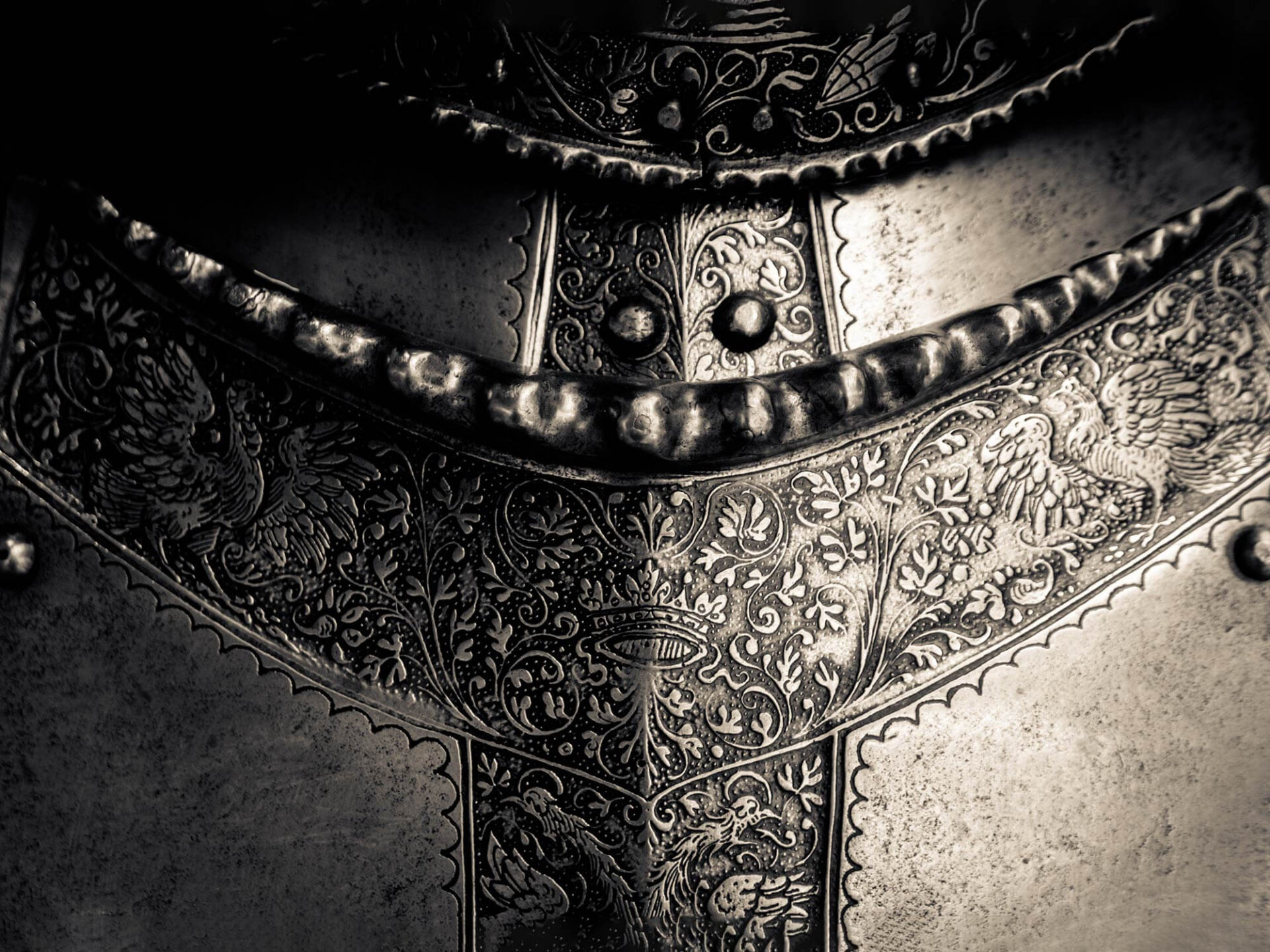As image-bearers of God, we all have an imaginative capacity. When we think about a coming event, we have a whole set of associations that help us envision what that will be like. Take, for example, when snow is predicted. Depending on your point of view, how you envision that event will vary. Some people envision a problem, a hassle—a struggle to shovel, to get the car out, to get to work. Children usually envision a snow storm quite differently. They are excited and happy—no school, sleeping in, sledding. I grew up in Hawaii and so I envision a snowstorm as a special treat—one of life’s great joys.
In a similar way, how we envision spiritual warfare will affect how we think about our lives as Christians. It will affect how you seek to help and counsel others. Some Christians envision spiritual warfare as a scary movie with ghosts and bizarre special effects. Others don’t envision the battle we are in at all. They don’t live in the reality that we are up against forces bigger than ourselves, forces that are highly deceptive, and are vying for our allegiance.
Paul, in Ephesians, provides the counterpoint to fear and to indifference. In the previous chapter, we saw four ways the Bible helps us understand spiritual warfare. To build upon that understanding, we will here hone in on four key truths Paul offers us about how to envision spiritual warfare. These truths will clear up our misconceptions about spiritual warfare and the role of the armor of God. Then we will look at how “be strong in the Lord and in the strength of his might” is the overarching theme of all of Ephesians, including the section on spiritual warfare.
Here is Ephesians 6:10–20:
10 Finally, be strong in the Lord and in the strength of his might. 11 Put on the whole armor of God, that you may be able to stand against the schemes of the devil. 12 For we do not wrestle against flesh and blood, but against the rulers, against the authorities, against the cosmic powers over this present darkness, against the spiritual forces of evil in the heavenly places. 13 Therefore take up the whole armor of God, that you may be able to withstand in the evil day, and having done all, to stand firm. 14 Stand therefore, having fastened on the belt of truth, and having put on the breastplate of righteousness, 15 and, as shoes for your feet, having put on the readiness given by the gospel of peace. 16 In all circumstances take up the shield of faith, with which you can extinguish all the flaming darts of the evil one; 17 and take the helmet of salvation, and the sword of the Spirit, which is the word of God, 18 praying at all times in the Spirit, with all prayer and supplication. To that end, keep alert with all perseverance, making supplication for all the saints, 19 and also for me, that words may be given to me in opening my mouth boldly to proclaim the mystery of the gospel, 20 for which I am an ambassador in chains, that I may declare it boldly, as I ought to speak.
Ephesians 6:10–20
First, it is important to remember that Ephesians 6:10–20 is not introducing a new topic.
Paul begins this section by saying “finally” and that’s our signal that he is giving a summary of his letter. This passage draws together everything that Paul has already been saying, and puts an exclamation point on it. Here are six key elements that thread through the whole letter and simply come to a climax in this conclusion.
- Jesus Christ is the Lord. Throughout Ephesians, Paul shows how God’s grace has brought us into his Son’s mercy, power, and mission. At the center of spiritual warfare is not the devil. It’s Jesus Christ.
- God is powerful and merciful. Paul has repeatedly affirmed the life-giving strength of God working within us (1:19; 2:5, 10; 3:16–20).
- The spiritual forces of evil—devil, flesh, world—are active. Paul has already brought in what we might call this dark trinity of evil throughout the letter and how they work in synergy with each other. He has already described the cosmic authorities (1:21; 3:10), the deadly hold of the world, the evil and darkness of fallen hearts (2:1–3; 4:17–19), and our call to stand against the devil’s purposes (4:27).
- We live in difficult times. Paul has previously called us to be alert and wise when the days are dark (4:14; 5:3–17).
- We are to walk as children of light. Ephesians has already spoken in great detail about how faith, love, and wisdom (1:12–19; 2:8–10; 3:14–6:9) supplant foolishness, alienation, and hardness of heart (2:1–3; 2:11–13; 4:14; 4:17–5:18). At the heart of Ephesians as a whole is the battle for the loyalty of our hearts. Do we walk as children of light or children of darkness? Whose voice do we listen to? What will shape our choices and our relationships? These are the crucial questions that Paul is focusing on throughout Ephesians.
- Pray for others. Paul has already given vivid, first-person examples of how to intercede for each other about what we most need (1:16–23; 3:14–21).
All of Ephesians is about our conflict with darkness—within ourselves, with other people, with the spiritual forces of evil. Christ’s triumph over all that is evil, dark, and deadly is the message throughout. Now all these strands come together in one final description of life in Christ. Spiritual warfare is our participation in the Lord’s cosmic war with darkness. The Lord is the warrior. The weapons describe his strength and what he does. By his strength we participate in what he is doing. Ephesians 6:10–20 shows us how. Ephesians 6 is not changing the subject. Failure to recognize that turns “spiritual warfare” into a wildcard of ideas and practices that are antithetical to the Lord’s explicit teaching and intentions.
Second, it’s important to remember that spiritual warfare is done together, as the body of Christ.
The whole of Ephesians is about the body of Christ, and Paul is not suddenly switching focus in the section on the armor of God. A friend of mine put it this way: “We don’t want to envision a whole bunch of little individuals running around in armor.” Instead, envision the body of Christ standing in battle together.
We each do our part, so we are not negating the individual, but we are doing our parts together as one body. When Paul says in Ephesians 4:27 not to give the devil a foothold, he is referring to divisions within the body of Christ. Ephesians is about union and communion with Christ and union and communion with each other in Christ. Spiritual warfare is against the forces that would divide and break our fellowship with Christ and with one another.
Spiritual warfare is not just about ourselves and our relationship with God. It’s about the people around us. Who benefits when we stand against the world, the flesh, and the devil? Yes, God is glorified when we stand. Yes, we are blessed when we stand. But other people also benefit. When we live as children of light, the light of the glory of God shines in our dark world. Standing against evil is not a separate topic from the one-anothering passages in Ephesians 4 and 5. We stand against evil and shine light into darkness as we live out Paul’s call to “Be kind to one another, tenderhearted, forgiving one another, as God in Christ forgave you” (Ephesians 4:32).
Third, it is important that we rightly envision the “panoplion” of God.
The word “panoplion” is usually translated “whole armor.” But “armor” creates the wrong mental picture, and popular teaching on this passage puts the emphasis in the wrong places. For starters, panoplion does not mean protective armor. It means the “complete weaponry” needed to go into combat. It means you have all the tools to do the job. You are fully outfitted and equipped for a calling. Paul chose this metaphor to give us a striking mental picture, but he is not commenting on the outfit worn by Roman soldiers (as the metaphor is frequently explained). His images come from Isaiah and the Psalms. The soldier we are to imagine is not a Roman centurion, but the divine, messianic King of kings. We are to imagine the Lord God coming in person, coming in power, coming to make right all that is wrong.
Fourth, it is important that we rightly envision spiritual warfare as mounting an offense, not playing defense.
Popular teaching makes associations about the protective aspect of individual items. But the Bible uses this imagery to portray the Lord overthrowing the powers-that-be in a darkened world. Christ comes bringing mercy to the humble and mayhem to the haughty. Paul is not describing how to maintain a defensive posture. When the Lord comes in person, he is taking initiative. He is not on the defensive.
Spiritual warfare is what happens when he enlists us in his cause and equips us to join his battle. It’s about light invading darkness. Often when people envision spiritual warfare, they think “I’m under attack” and that is true. Satan does have his wily ways and he is out to get us. But we are also God’s invading army, and we are on the attack. We are bringing light into a dark world. The children of light, the army of light, the servants of light are on the offensive.
In 2 Corinthians, Paul references all of his hardships, but then talks about how he has the “weapons of righteousness in the right hand and the left” (2 Corinthians 6:7 NIV). Paul is going to war. The war is not just coming to him. But what are the weapons he fights with? They are humility, love, truth, courage, faithfulness, goodness, and wisdom. These are unusual weapons, aren’t they? It’s much easier to rely on special words or prayers that will cast out demons. But the real project of spiritual warfare is much harder and much better. We fight like Jesus did when he came to this dark world. He is the Lord of light and he calls us to bring the light of his love into this dark world.
Excerpted from Safe and Sound ©2019 by David Powlison, New Growth Press. May not be reposted without permission.






